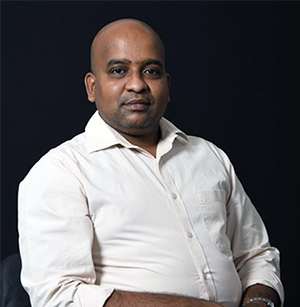

Dr Kaviyarasu Kasinathan, Senior Researcher at UNESCO Chair Nanoscience & Nanotechnology
Dr Kaviyarasu Kasinathan is a C3 rated Senior Researcher at the United Nations Educational, Scientific and Cultural Organization (UNESCO) in the Unisa iThemba Laboratories (ITL) / National Research Foundation (NRF). He has produced over 250 peer-reviewed publications in diverse areas, including energy materials, biocatalysts and supercapacitors. His strong record of publications demonstrates his excellence in research and significant contributions to the field of chemical sciences.
The Royal Society of Chemistry is a professional society that believes in advancing excellence in chemical sciences. The society comprises the most renowned scientists, engineers and technologists globally. A researcher can become a Fellow of the Royal Society after occupying a senior position in the field for more than five years and if their efforts have made a significant impact in the field of chemical sciences. As a senior researcher, it took Kasinathan about five years to earn the honour of being a Fellow.
Kasinathan believes his work is acknowledged because of his commitment to contributing to sustainable development goals. He says: "I have much to contribute, and I hope to improve my understanding of one of the agenda items, the Sustainable Development Goals (SDGs). These represent an urgent call for action by all developed and developing countries working together within the global community. Hence, we must coordinate our efforts under the United Nations framework while understanding each other’s concerns." He adds: "This is within the context of the National Development Plan (NDP) by the National Science and Technology Forum (NSTF)."
With a future-oriented approach to his research, Kasinathan believes that in a world where industries, organisations, public institutions, publishers and work norms continue to shift and evolve, it will become increasingly necessary to reskill and upskill. In addition, he feels that we need to put more effort into remaining internationally competitive soon. In overcoming these challenges, he also believes that he will need to rethink current approaches to skills gaps.
He hopes this honour will enhance his research profile and the impact of his journal articles by increasing the visibility of his publications. Through publishing, he wishes to contribute to shaping scientific policy. However, he still believes that he has not yet achieved his goals or demonstrated the full extent of his accomplishments. Therefore, one of his primary purposes is to enhance visibility in the cross-border landscape of nanoscience and nanotechnology with Unisa as a central platform.
By receiving this award, he hopes to receive personalised guidance from the Royal Society of Chemistry. "Participating in editorial panels of various journals and being an ambassador are ways to shape the future of the field," he noted. He also affirmed the importance of remaining internationally competitive.
* By Hanli Wolhuter, Communication and Marketing Specialist & Musa Buthelezi, Intern, College of Graduate Studies
Publish date: 2022-08-10 00:00:00.0